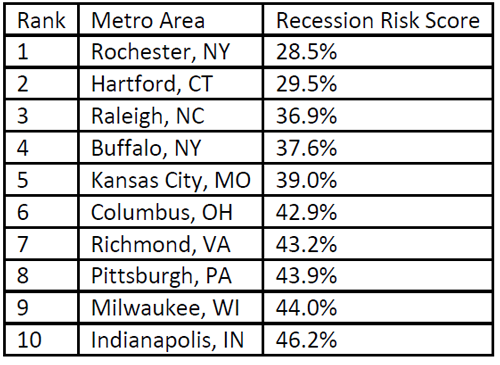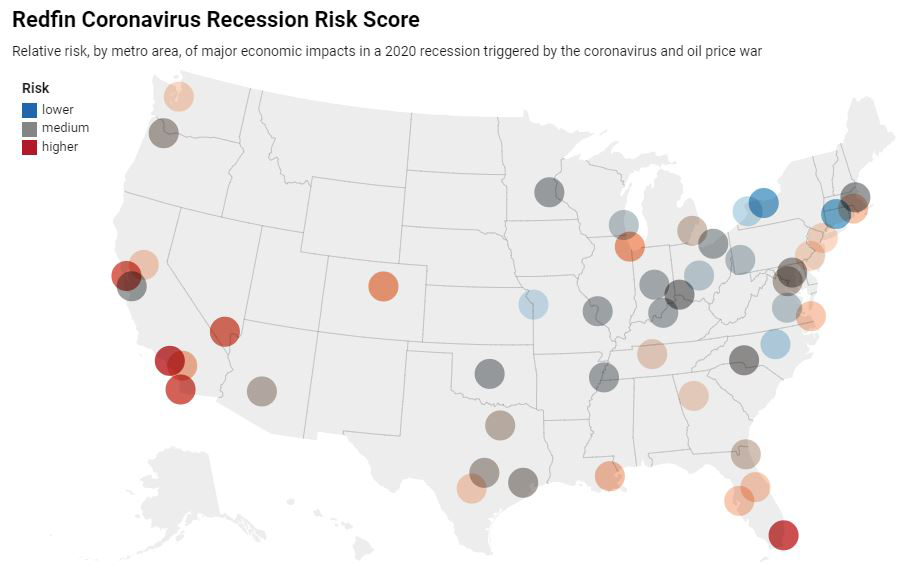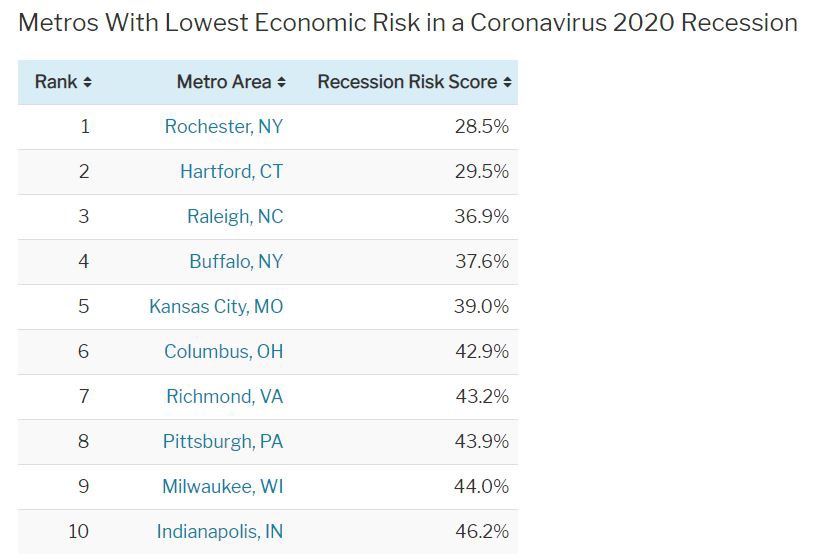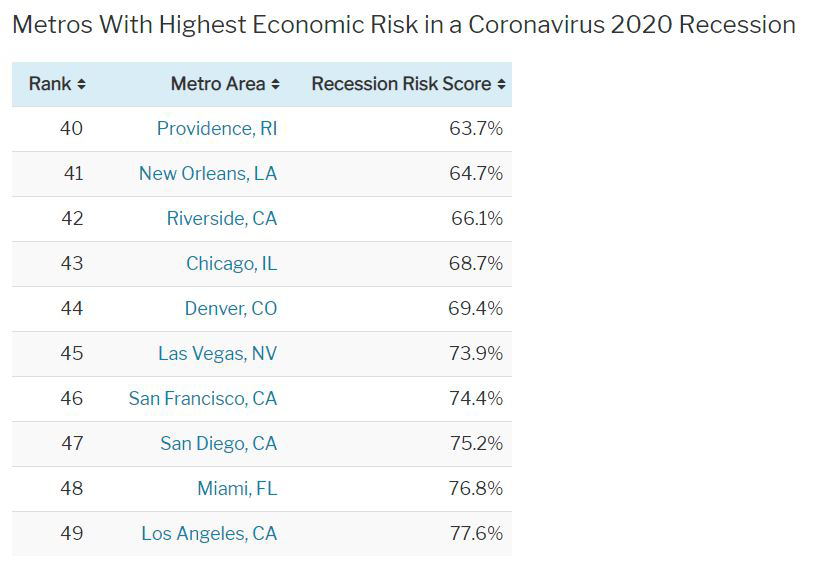The WPJ
THE WORLD PROPERTY JOURNALReal Estate Facts Not Fiction
Residential Real Estate News

Affordable East Coast, Midwest Housing Markets Have Lowest Economic Risk from COVID-19 Recession
Residential News » Seattle Edition | By Michael Gerrity | April 1, 2020 9:00 AM ET
According to U.S. real estate brokerage firm Redfin, affordable East Coast and Midwest cities have the lowest overall economic risk in the 2020 recession that began in March 2020.
The one-two punch of the coronavirus (COVID-19) and an oil price war between Saudi Arabia and Russia has rapidly brought to reality a possibility that seemed remote just a few months ago, but the impact in the real estate market is likely to be short-lived and much less extreme than the 2008 Great Recession.
Rochester, Hartford, and Raleigh have the lowest overall economic risk in this recession, while Los Angeles, Miami, and San Diego have the highest risk, based on a late March 2020 analysis by Redfin economists.
Housing is Well Positioned to Weather This Storm
Because the housing market was strong going into the 2020 recession, there's currently no reason to expect a major crash in home prices. In fact, the driving factors for this 2020 recession are unrelated to real estate, which is just one of the reasons at this time Redfin believes fallout in the U.S. real estate market will be mild, and nowhere near the catastrophe of the 2008 Great Recession.
"The housing market came into this turmoil in a strong position, with a very low supply of homes for sale and record levels of home equity," said Redfin lead economist Taylor Marr. "Home equity can function as a rainy day fund. Homeowners can weather a storm of falling home values without the pressure to walk away from their home. They can also better handle a loss of income if they can tap into their equity with a home equity line of credit (HELOC). This stabilizes the market, preventing an influx of supply from foreclosures, which would further cause prices to fall in a vicious cycle. Additional government support provided through the stimulus bill CARES Act and a moratorium on foreclosures can also prevent a falling out during this pandemic."
To evaluate the potential impact of the 2020 recession on the local economies of the 49 largest U.S. cities, Redfin analyzed a variety of general factors, as well as some specific to this recession, such as rates of leisure and hospitality employment, debt-to-income ratios, number coronavirus cases and air transportation employment.
Metros With Lowest Economic Risk in the Coronavirus 2020 Recession

High Debt, High Density and Expensive Housing Make Some Cities More Susceptible
While many cities are expected to weather the 2020 recession, some will be harder hit than others. Because the impacts on other, non-housing sectors of the economy, especially employment, are likely to be very large, some metro areas face a greater economic risk during the 2020 recession. Those that are hit the hardest overall are also likely to be more at risk of a real estate downturn.
"Some cities have factors that make them more susceptible to losing their footing and are likely to be hard hit," continued Marr. "Amidst rapidly rising layoffs, it will be especially difficult to sell a home in these markets, and yet buyers will likely find limited options as sellers delay listing, leaving the housing market in a standstill. Federal support will help cushion the fall, but in these areas it will take significantly longer to recover."
The cities most likely to face economic risk tend to be those with high home prices, high levels of personal debt, and large numbers of people employed in the hospitality industry, which applies to most of the big cities in the West. San Jose (48.4%) is the only metro area in the West with a recession risk score below 50%.
The metro area with the highest risk of economic damage during this coronavirus recession is Los Angeles, with an overall score of 77.6%, followed by Miami (76.8%) and San Diego (75.2%). Chicago and Denver stand out as unusual among the 10 metros at greatest risk as, unlike most others on the list, neither is a typical "boom-bust" town. Both have relatively high population density, large employment bases in air transportation and a large rate of existing coronavirus cases, which drove up their overall risk scores.
The one-two punch of the coronavirus (COVID-19) and an oil price war between Saudi Arabia and Russia has rapidly brought to reality a possibility that seemed remote just a few months ago, but the impact in the real estate market is likely to be short-lived and much less extreme than the 2008 Great Recession.
Rochester, Hartford, and Raleigh have the lowest overall economic risk in this recession, while Los Angeles, Miami, and San Diego have the highest risk, based on a late March 2020 analysis by Redfin economists.
Housing is Well Positioned to Weather This Storm
Because the housing market was strong going into the 2020 recession, there's currently no reason to expect a major crash in home prices. In fact, the driving factors for this 2020 recession are unrelated to real estate, which is just one of the reasons at this time Redfin believes fallout in the U.S. real estate market will be mild, and nowhere near the catastrophe of the 2008 Great Recession.
"The housing market came into this turmoil in a strong position, with a very low supply of homes for sale and record levels of home equity," said Redfin lead economist Taylor Marr. "Home equity can function as a rainy day fund. Homeowners can weather a storm of falling home values without the pressure to walk away from their home. They can also better handle a loss of income if they can tap into their equity with a home equity line of credit (HELOC). This stabilizes the market, preventing an influx of supply from foreclosures, which would further cause prices to fall in a vicious cycle. Additional government support provided through the stimulus bill CARES Act and a moratorium on foreclosures can also prevent a falling out during this pandemic."
To evaluate the potential impact of the 2020 recession on the local economies of the 49 largest U.S. cities, Redfin analyzed a variety of general factors, as well as some specific to this recession, such as rates of leisure and hospitality employment, debt-to-income ratios, number coronavirus cases and air transportation employment.
Metros With Lowest Economic Risk in the Coronavirus 2020 Recession

High Debt, High Density and Expensive Housing Make Some Cities More Susceptible
While many cities are expected to weather the 2020 recession, some will be harder hit than others. Because the impacts on other, non-housing sectors of the economy, especially employment, are likely to be very large, some metro areas face a greater economic risk during the 2020 recession. Those that are hit the hardest overall are also likely to be more at risk of a real estate downturn.
"Some cities have factors that make them more susceptible to losing their footing and are likely to be hard hit," continued Marr. "Amidst rapidly rising layoffs, it will be especially difficult to sell a home in these markets, and yet buyers will likely find limited options as sellers delay listing, leaving the housing market in a standstill. Federal support will help cushion the fall, but in these areas it will take significantly longer to recover."
The cities most likely to face economic risk tend to be those with high home prices, high levels of personal debt, and large numbers of people employed in the hospitality industry, which applies to most of the big cities in the West. San Jose (48.4%) is the only metro area in the West with a recession risk score below 50%.
The metro area with the highest risk of economic damage during this coronavirus recession is Los Angeles, with an overall score of 77.6%, followed by Miami (76.8%) and San Diego (75.2%). Chicago and Denver stand out as unusual among the 10 metros at greatest risk as, unlike most others on the list, neither is a typical "boom-bust" town. Both have relatively high population density, large employment bases in air transportation and a large rate of existing coronavirus cases, which drove up their overall risk scores.
Sign Up Free | The WPJ Weekly Newsletter
Relevant real estate news.
Actionable market intelligence.
Right to your inbox every week.
Real Estate Listings Showcase
Related News Stories
Residential Real Estate Headlines
- Las Vegas Area Home Prices Uptick 4.3 Percent Annually in March
- Single-Family Rent Growth in U.S. Trends Upward in 2025
- U.S. Mortgage Rates Tick Down Post Trump Tariffs Commencement
- President Trump's 'Liberation Day' Tariffs Potential Impact on the U.S. Housing and Mortgage Markets
- Baby Boomers Biggest Cohort of U.S. Home Buyers in 2025 as Millennials Decline
- U.S. Monthly Housing Payments Hit Record High in 2025
- U.S. Pending Home Sales Uptick in February
- Global Prime Residential Rent Slowdown Continued in Late 2024
- Ireland Home Price Inflation Hits 8 Year High in Early 2025
- Existing Home Sales in America Uptick in February
- Great Miami Area Residential Sales Decline 15 Percent Annually in February
- Mortgage Rates Uptick in Mid-March, Ending 9-Week Decline in U.S.
- World Property Ventures Builds the Future of Real Estate with New Funding Round
- U.S. Builder Sentiment Declines Amid Economic Uncertainty and Rising Costs
- Black Homeownership Rates in U.S. Enjoy Largest Annual Increase of All Racial Groups
- Wealthy Renters Are Taking Over More of the U.S. Rental Market
- If U.S. Congress Does Not Extend NFIP Soon, Thousands of Daily Home Closings Impacted
- U.S. Mortgage Applications Spike 11 Percent in Early March
- Greater Palm Beach Area Residential Sales Rise in Early 2025
- New Apartments in U.S. Are Leasing at Slowest Pace on Record
- U.S. Mortgage Rates Drop to 4 Month Low in March
- Overall U.S. Mortgage Delinquency Rates Dip in December
- New Tariffs on Canada, Mexico to Impact U.S. Homebuilder Input Costs
- Monaco's Property Market: A Tale of Two Cities
- U.S. Home Purchase Cancellations Surge, 1 in 7 Sales Getting Canceled
- U.S. Pending Home Sales Hit Historic Low in Early 2025
- Greater Miami Area Residential Sales Dip in January
- Governor DeSantis Supports Ending Property Taxes in Florida
- WPV Aims to Become the Berkshire Hathaway of Real Estate Tech
- U.S. Home Sales Slump Continues in January
- Average Americans Spend 38 Percent of Monthly Income on Mortgage Payments
- Switzerland's Safe-Haven Appeal Grows with World's Wealthy Homebuyers
- U.S. Builder Confidence Rapidly Declines in February
- Las Vegas Home Sales Rise 6.7 Percent Annually in January, Condo Sales Dip
- Homebuyer Demand in America Drops to 5-Year Low in Early 2025
- Ownership More Affordable Than Renting in Most U.S. Markets
- The World's First Global Listings Service Launches, Called a GLS
- Home Prices Continue to Rise in 89 Percent of U.S. Metros in Late 2024
- Global Luxury Residential Prices Showed Gradual Improvement in Late 2024
- U.S. Construction Hiring Rate Drops to Lowest Levels in 5 Years
Reader Poll
Marketplace Links
This website uses cookies to improve user experience. By using our website you consent in accordance with our Cookie Policy. Read More








